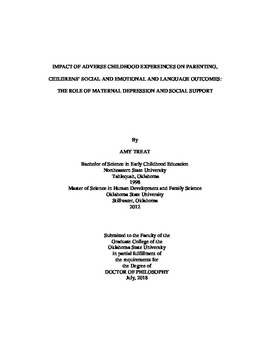| dc.contributor.advisor | Morris, Amanda Sheffield | |
| dc.contributor.author | Treat, Amy Elizabeth | |
| dc.date.accessioned | 2019-07-19T14:33:28Z | |
| dc.date.available | 2019-07-19T14:33:28Z | |
| dc.date.issued | 2018-07-01 | |
| dc.identifier.uri | https://hdl.handle.net/11244/320975 | |
| dc.description.abstract | Study One: In the current study we examine the relationship between mothers' adverse childhood experiences (ACEs) and children's social and emotional development in a sample of low income mothers and their young children (N = 42). The effects of maternal depression, social support, and parenting self- efficacy were examined on that relationship. ACE scores were measured retrospectively and depressive symptoms, social support and parenting self-efficacy were assessed when babies were between 3 and 11 months of age (M = 6.0). Children's social and emotional development was assessed one year later. Results indicated that mothers ACE scores predicted children's social and emotional problems one year later. However, parenting self-efficacy was found to fully mediate that relationship. Maternal depression mediated this relationship at a 90% confidence level. These findings suggest that one way mothers' early adversity affects their children's development is through its effects on maternal mental health and parenting confidence. | |
| dc.description.abstract | Study Two: In the current study, the quantitative (adult word count, child vocalizations) and qualitative (conversational turns, child vocal productivity) environments of young children were assessed. Specifically, the relationship between the quality of the home language environment, positive parenting behaviors, and mother's depressive symptoms were examined in a sample of low income young children (N = 26) (M age = 18 months). Language Enhancement Analysis software (LENA) was used to measure language environments using full day recordings collected in the child's natural environment. Parent-child interactions were assessed using standardized observational tasks for positive parenting behaviors, encouragement, affection, responsiveness and teaching. Mother's depressive symptoms were assessed when children were on average six-months old. Results indicate that observed maternal teaching behaviors predicted the qualitative features of the language environment while maternal depressive symptoms significantly predicted lower child vocal productivity scores. | |
| dc.format | application/pdf | |
| dc.language | en_US | |
| dc.rights | Copyright is held by the author who has granted the Oklahoma State University Library the non-exclusive right to share this material in its institutional repository. Contact Digital Library Services at lib-dls@okstate.edu or 405-744-9161 for the permission policy on the use, reproduction or distribution of this material. | |
| dc.title | Impact of Adverse Childhood Experiences on Parenting, Children's Social and Emotional and Language Outcomes: The Role of Maternal Depression and Social Support | |
| dc.contributor.committeeMember | Hays-Grudo, Jennifer | |
| dc.contributor.committeeMember | Williamson, Amy C. | |
| dc.contributor.committeeMember | Kennison, Shelia M. | |
| osu.filename | Treat_okstate_0664D_15863.pdf | |
| osu.accesstype | Open Access | |
| dc.description.department | Human Development and Family Sciences | |
| dc.type.genre | Dissertation | |
| dc.type.material | Text | |
